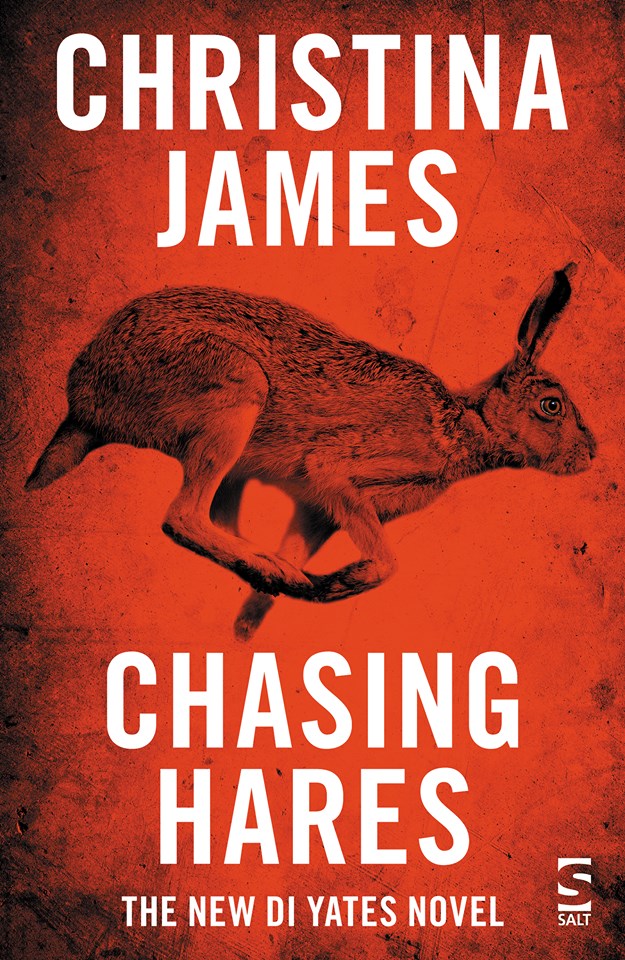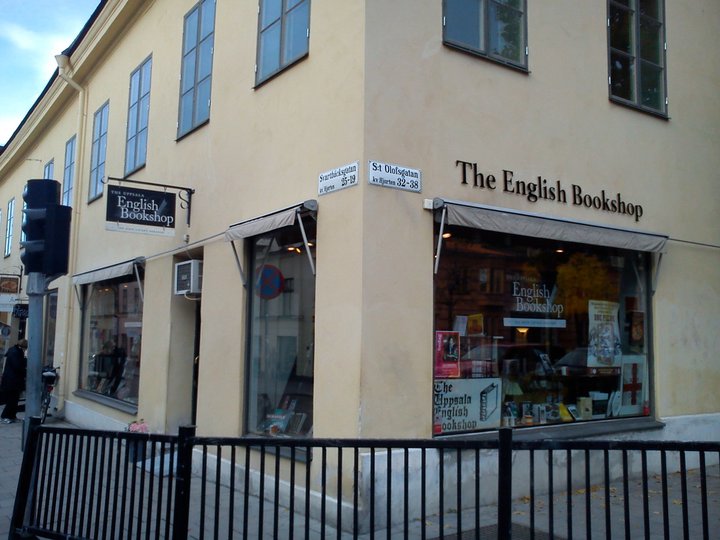A lovely Friday conversation with Jan Smedh, joint proprietor of The English Bookshop in Uppsala, a thriving independent business…
I’m delighted and very proud to discover that Almost Love has been chosen as the British Crime novel of the month by The English Bookshop in Uppsala. I asked Jan Smedh, who, with his business partner Christer, is joint proprietor of the shop, if I could call him. He kindly agreed to talk to me today, although he was busy making final preparations for his absence: he and his wife and three sons are about to leave for a holiday in Greece.
Jan told me that every month he chooses books for his reading groups and his book club. There are three reading groups: one for the Book of the Month, one for classics and (in Stockholm – he and Christer have just opened another shop there) one for children’s books. The book club operates as a subscription service. It has between fifty and sixty members scattered throughout Sweden. They choose the category to which they wish to subscribe and are each month sent a book in that category that Jan has chosen. They do not know in advance what the title will be.
He chooses titles from six categories altogether: the Book of the Month, which is always a literary novel; British Crime, ‘Tough’ Crime, Paranormal, Fantasy and Science Fiction. He tries to introduce a spread of themes and to get a balance between male and female authors and authors from different countries; for example, he has featured Asian authors who write in English. His choices are pretty unerring: his customers always seem to like them.
Jan said that when he read the description of Almost Love, he ‘loved it at once’. (I’m blushing as I write!) He tries to pick books by authors from small publishers that aren’t necessarily well-known, rather than blockbusters. The subject of Almost Love seems to be exactly what his readers are looking for: it has a bit of history, a bit of archaeology, some local background, a good plot and a strong psychological element. He says that his favourite customer is ‘someone who leaves the shop with a book that they didn’t know that they wanted.’ His copies of Almost Love have yet to arrive (there has been a slight delay in the printing, caused by MPG’s having gone into receivership two weeks ago), but they should reach the shop next Monday, so he didn’t know until I told him that there is also a Scandinavian element to the plot. He was delighted about this.
Jan learned about Almost Love from a Scottish publishers’ rep who carries titles from several independent publishers. His name is Stuart Siddall. I had not heard of him before, but I shall certainly get in touch with him now and I should like to take this opportunity to thank him.
I asked Jan about the inspiration for The English Bookshop. He said that he and Christer came up with the idea for it in 1995. They received no financial backing; they raised all the money themselves. Christer was already working in the bookselling industry (largely in the academic sector), so he had the contacts with UK publishing companies, who were therefore prepared to set up accounts for the new venture. It would not have been possible without their support. Jan’s own background is in communications and the business has benefited a great deal from this. It is he who designs the graphics for the website. He is prolific on the social networks and the shop has very active Facebook and Twitter accounts. He says that the key thing with social networking is to be consistent. He has worked hard to build up a loyal customer following and he knows he must maintain their interest by continually being there for them. His own love of books goes back to his childhood. He also speaks impeccable English: he explained that he has lived in Cork and has also visited the UK (he would like to see much more of it) and the USA.
95% of The English Bookshop’s customers are Swedish, though there is an ex-pat community in Uppsala, which is a university town (Jan describes it as ‘the Oxbridge of Sweden’). Most Swedes read English, and Jan’s customers are getting younger: some twelve-year-olds now buy books in English. Uppsala is also Sweden’s religious centre and the city in which the Monarch is crowned. It is Sweden’s fourth largest city and not huge, but it has the weight of history behind it and is home to many very well-educated people. Jan and Christer made the conscious decision to stay away from university course texts: they wanted their bookshop to provide leisure reading. By this, he doesn’t mean that all the books he sells are ‘light’: his readers like books about many subjects, as well as fiction. British history, books about war and books about psychology are all popular. Sales of non-fiction titles are growing; also crime fiction and children’s titles. The Swedish government has now set up English language schools, which means that parents are looking for books in English for their children. The English Bookshop tries hard to keep abreast of the continually changing interests of the local community and its unique stockholding reflects this. Jan says that ‘other bookshops aren’t doing this any more; there’s often a drab uniformity about what’s available from the big chains.’ Smaller publishers often complain that it’s difficult to get a proper presence in them. This view would certainly resonate with Salt, whose many distinguished authors often struggle to get adequate shelf-space in chain bookshops. It would also be endorsed by the UK’s many excellent independent booksellers, some of whom Jan knows. He has met Jane Streeter, a former President of the Booksellers Association, and is himself a member of the BA, for which he has a high regard.
In the last six years the turnover of The English Bookshop in Uppsala has doubled, enabling it to open the second shop in Stockholm. Jan says that this ‘goes against the grain’ of Swedish bookselling generally, so he feels that he and Christer ‘must be doing something right.’ I’d say they were doing a great deal right! The business is now eighteen years old.
It was delightful to have the opportunity to talk to Jan, and I am very grateful to him for giving me so much of his time and as well, of course, for choosing Almost Love. I now have an open invitation to visit The English Bookshop, which I am determined to take up. I’d like to visit the one in Stockholm, too! I wish Jan and his family a very happy holiday indeed in Greece. If any of his customers should read this, I’d also like offer you a big thank you and to say that I very much hope that you will enjoy Almost Love. Perhaps we may meet in the bookshop one day.



